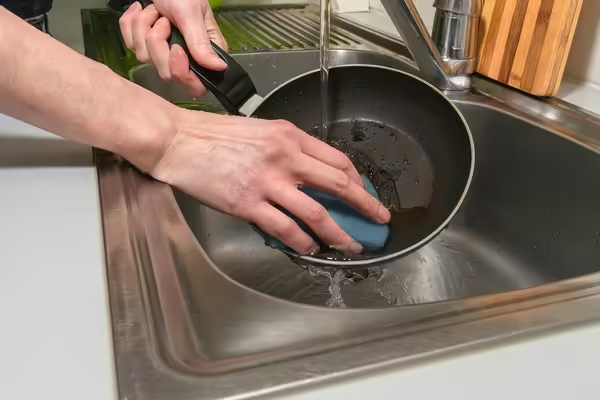
URBANA, Ill. — PFAS are chemicals commonly found in consumer goods that are making their way into drinking water supplies where they are a risk to human health, but there are steps people can take to protect themselves.
PFAS, per- and polyfluoroalkyl substances, are a group of more than 15,000 man-made chemicals that are sometimes added to products to help them resist grease, oil, water, and heat. These “forever chemicals” are found in a wide array of consumer goods, including clothing, cosmetics, food packaging, carpets, cookware, and cleaning products. As a result of their widespread use, PFAS have migrated into soils, lakes, rivers, and streams across the U.S.
No level of PFAS exposure comes without risk to human health, according to a recent press release from the U.S. EPA. PFAS break down slowly and can accumulate in aquatic plants and animals as well as people. Exposure to PFAS through the skin or digestive system has been linked to increased risk of certain cancers, kidney and heart disease, and reproductive issues like low birth weight and birth defects. This spring, the U.S. Environmental Protection Agency announced the first federal legal protections to protect public drinking water from PFAS.
Sarah Zack, pollution prevention specialist with Illinois-Indiana Sea Grant, works with the public to raise awareness about water contaminants, including PFAS.
“It’s not easy to reduce our risk from PFAS chemicals because they are ubiquitous in the environment,” Zack said. “But there are some simple ways to reduce your exposure and protect your health.”
- Replace nonstick pans at the first sign of scratches, and do not heat beyond the recommended temperature, which is typically 400 degrees Fahrenheit. Avoid using nonstick cookware altogether, if possible, and opt for stainless steel, cast iron, or ceramic.
- Microwave popcorn bags, takeout containers, and fast-food packaging can be coated with PFAS to prevent sticking. Be a cautious consumer and do research before eating food from this packaging.
- Avoid stain-resistant carpets, upholstery, and other fabrics. Vacuum regularly to remove PFAS that can accumulate in dusty fabrics.
- Leave shoes at the door to avoid tracking chemicals into your home.
- Check advisories before eating locally caught seafood.
- Contact your public water utility about whether your drinking water has been tested for PFAS. If you are on a private well, conduct regular testing. Consider an at-home water filtration system if you are concerned about the FAS level in your water.
Zack discusses PFAS more in the University of Illinois Extension Spotlight on Natural Resources podcast available at go.illinois.edu/Spotlight.
Illinois-Indiana Sea Grant is a partnership between NOAA, University of Illinois Extension, and Purdue University Forestry and Natural Resources, bringing science together with communities for solutions that work. Sea Grant is a network of 34 science, education, and outreach programs located in every coastal and Great Lakes state, Lake Champlain, Puerto Rico, and Guam.
Illinois Extension leads public outreach for University of Illinois by translating research into action plans that allow Illinois families, businesses, and community leaders to solve problems, make informed decisions, and adapt to changes and opportunities. Illinois Extension is part of the University of Illinois Urbana-Champaign College of Agricultural, Consumer and Environmental Sciences.